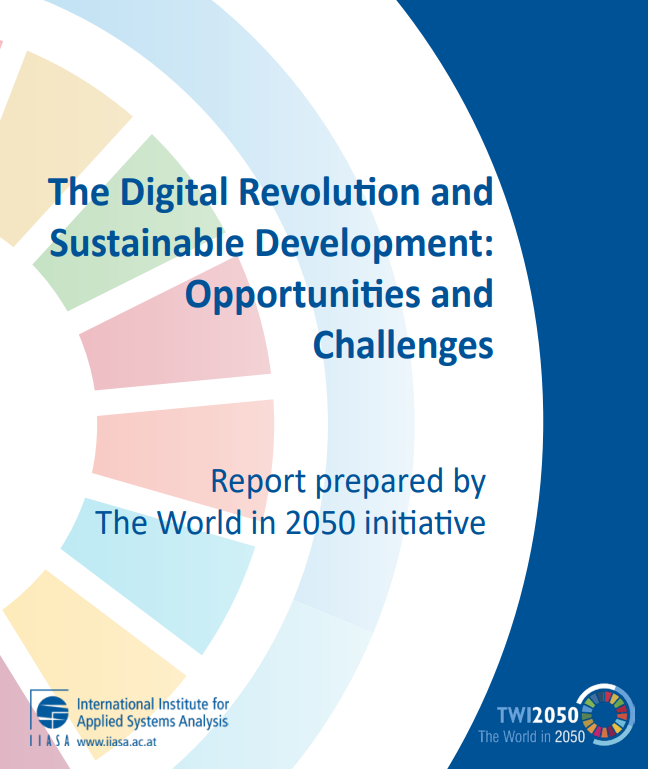The Digital Revolution and Sustainable Development Opportunities and Challenges
Report prepared by The World in 2050 initiative

07 November 2019
International Institute for Applied Systems Analysis (IIASA)
English
Book
Asia, Australia, Europe, North America, South America
The Digital Revolution, including technologies such as virtual and augmented reality, additive manufacturing or 3D Printing, (general purpose) artificial intelligence, or the Internet of Things, has entered the public discourse in many countries. Looking back, it is almost impossible to believe that digitalization is barely featured in the 2030 Agenda or the Paris Agreement.
It is increasingly clear that digital changes, we refer to them as the Digital Revolution, are becoming a key driving force in societal transformation. The transformation towards sustainability for all must be harmonized with the threats, opportunities and dynamics of the Digital Revolution, the goals of the 2030 Agenda and the Paris Agreement. At the same time, the digital transformation will radically alter all dimensions of global societies and economies and will therefore change the interpretation of the sustainability paradigm itself. Digitalization is not only an ‘instrument’ to resolve sustainability challenges, it is also fundamental as a driver of disruptive change.
This report that focuses on the Digital Revolution is the second one by The World in 2050 (TWI2050) that was established by the International Institute for Applied Systems Analysis (IIASA) and other partners to provide scientific foundations for the 2030 Agenda. This report is based on the voluntary and collaborative effort of 45 authors and contributors from about 20 institutions, and some 100 independent experts from academia, business, government, intergovernmental and non-governmental organizations from all the regions of the world, who met four times at IIASA to develop science-based strategies and pathways toward achieving the Sustainable Development Goals (SDGs).
The focus of this report is Digital Revolution, the 'Sixth Transformation' (from the first TWI2050), The Digital Revolution. Although it is arguably the single greatest enabler of sustainable development, it has, in the past, helped create many negative externalities like transgression of planetary boundaries. Progress on the SDGs will be facilitated if we can build and implement detailed science, technology and innovation (STI) roadmaps at all levels that range from local to global. STI is a forceful driver of change connected to all 17 SDGs. The Digital Revolution provides entirely new and enhanced capacities and thus serves as a major force in shaping both the systemic context of transformative change and future solutions; at the same time it potentially carries strong societal disruptive power if not handled with caution, care and innovativeness.
This report assesses all the positive potential benefits digitalization brings to sustainable development for all. It also highlights the potential negative impacts and challenges going forward, particularly for those impacted by the “digital divide” that excludes primarily people left behind during the Industrial Revolution like the billion that go hungry every night and the billion who do not have access to electricity. The report outlines the necessary preconditions for a successful digital transformation, including prosperity, social inclusion, environmental sustainability and good governance. Importantly it outlines some of the dramatic social implications associated with an increasingly digital future. It also covers a topic that so far has not been sufficiently dealt with in the cross-over discussions between sustainability and the Digital Revolution, that is, the considerations about related governance aspect.
Abstract based directly on original source. Back to the SmartCity.ZA collection.


Comments